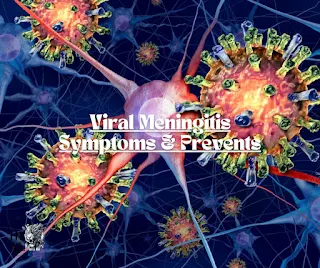Viral Meningitis Symptoms & Prevents
Viral and bacterial meningitis share symptoms such as fever, chills, headache, neck stiffness, nausea, and sensitivity to light. However, bacterial meningitis can lead to severe complications, necessitating immediate medical attention. Here’s an overview of viral meningitis, its distinctions from bacterial meningitis, and crucial considerations.
Viral vs. Bacterial Meningitis: Understanding the Differences
Viral meningitis results from viral infections affecting the meninges, the protective membranes surrounding the brain and spinal cord. It is more prevalent in young children and is often termed aseptic meningitis. Distinguishing viral from bacterial meningitis requires professional evaluation due to the potential severity of bacterial cases.
Symptoms and Causes
What are the symptoms of viral meningitis?
- Fever
- Chills
- Headache
- Neck stiffness
- Nausea or vomiting
- Sensitivity to light
- Lack of appetite
- Difficulty focusing
- Double vision
Viral Meningitis Signs in Infants:
- Fever
- Vomiting
- Bulging “soft spot” on the baby’s head
- Irritability
- Decreased appetite
- Sleepiness or difficulty waking up
- Low energy or lethargy
What causes viral meningitis?
- Viruses responsible for meningitis include non-polio enteroviruses, herpes simplex, Epstein-Barr, varicella-zoster, mumps, measles, arboviruses (West Nile, Zika), HIV, influenza viruses, and LCMV. Transmission occurs through respiratory droplets, close contact, shared items, and occasionally via mosquito bites.
Is viral meningitis contagious?
- While the viruses causing meningitis are contagious, they usually lead to other illnesses rather than meningitis itself. Risk factors include age below 5, weakened immune systems, and communal living.
Complications of Viral Meningitis
Though less likely to cause complications than bacterial meningitis, viral meningitis can result in serious short- and long-term effects, particularly in young children, including vision and hearing loss, memory issues, movement difficulties, and learning challenges.
Diagnosis and Tests
How is viral meningitis diagnosed?
- Healthcare providers diagnose viral meningitis through neurological exams and cerebrospinal fluid testing. Specific tests may include lumbar puncture, blood tests, nasal or throat swabs, and imaging such as CT scans or MRIs.
Management and Treatment
How is viral meningitis treated?
- Treatment varies based on the causative virus. Antiviral medications, corticosteroids, pain relievers, and IV fluids may be employed. Antibiotics may be initiated until the cause is confirmed, considering the urgency of bacterial meningitis.
Prevention
Can viral meningitis be prevented?
- Reducing the risk involves vaccinations, good hand hygiene, surface disinfection, safe sex practices, protection from bug bites, and avoiding contact when sick. Travelers should acquire information on prevalent infectious diseases at their destination.
Outlook / Prognosis
Viral meningitis generally has a favorable prognosis. Treatment focuses on symptom management, and recovery duration varies, with some individuals taking weeks to fully recover.
Living With
When should I see my healthcare provider?
- Consult a healthcare provider if symptoms of viral meningitis arise, allowing them to assess severity and determine appropriate treatment.
When should I go to the ER?
- Emergency room visits are necessary for severe symptoms like neck stiffness, severe headache, double vision, confusion, or other mental changes.
What questions should I ask my doctor?
- Key inquiries include treatment options, symptom management, follow-up schedules, indicators for ER visits, and potential contagion to others.

